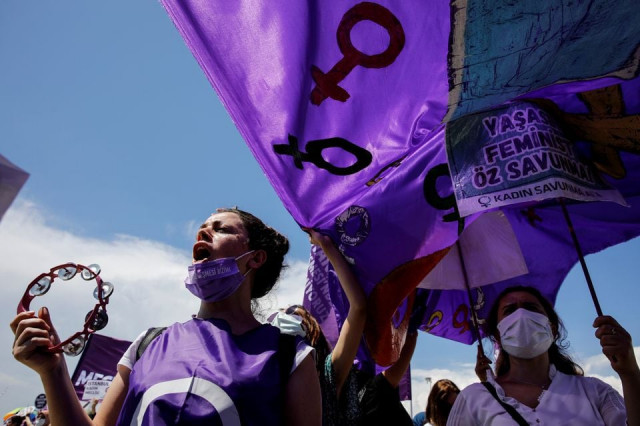Erdogan defiant as Turkey quits violence-on-women treaty
Thousands were set on Thursday to protest the decision across Turkey, where femicide has surged

President Tayyip Erdogan defended Turkey's withdrawal on Thursday from an international treaty to prevent violence against women, a move that has drawn condemnation from many Turks and Western allies.
The Istanbul Convention, negotiated in Turkey's biggest city and signed in 2011, committed its signatories to prevent and prosecute domestic violence and promote equality. Erdogan announced the withdrawal in March in favour of local laws to protect women's rights.
Thousands were set on Thursday to protest the decision across Turkey, where femicide has surged. A court appeal to halt the withdrawal was rejected this week.
"Some circles are trying to portray our withdrawal from the Istanbul Convention as a step backwards in our battle with violence against women," he said during a speech in Ankara to present an alternative action plan.
"Our battle did not start with the Istanbul Convention and it will not end with our withdrawal from the treaty," he said.
Ankara's withdrawal triggered condemnation from both the United States and the European Union, and critics say it puts Turkey even further out of step with the bloc that it applied to join in 1987.
Three opposition parties also pulled out of a parliamentary commission on Thursday to protest the decision.
"We will continue our struggle," Canan Gullu, president of the Federation of Turkish Women's Associations, said on Wednesday. "Turkey is shooting itself in the foot with this decision."
She said that since March, women and other vulnerable groups had been more reluctant to ask for help and less likely to receive it, with Covid-19-fuelled economic difficulties causing a dramatic increase in violence against them.
One monitoring group has logged roughly one femicide per day in Turkey since a sharp rise five years ago.
Proponents of the convention and related legislation say more stringent implementation is needed.
But many conservatives in Turkey and in Erdogan's AK Party say the pact undermines the family structures that protect society.
Some also see the Convention as promoting homosexuality through its principle of non-discrimination on grounds of sexual orientation.
Ditching the pact "will not lead to any legal or practical shortcoming in the prevention of violence against women," Erdogan's office said Tuesday to the administrative court that rejected the appeal.
This month, Council of Europe Commissioner for Human Rights Dunja Mijatovic sent a letter to Turkey's interior and justice ministers expressing concern about a rise in homophobic narratives by some officials, some of which targeted the convention.
"All the measures provided for by the Istanbul Convention reinforce family foundations and links by preventing and combating the main cause of destruction of families, that is, violence," she said.



















COMMENTS
Comments are moderated and generally will be posted if they are on-topic and not abusive.
For more information, please see our Comments FAQ